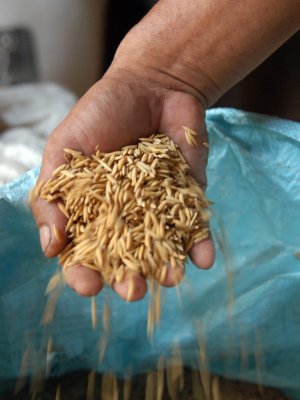Financial Times | March 4 2009
Javier Blas
Saudi Arabia has announced the arrival of the first food crop harvested in Saudi-owned farms abroad, in a sign that the kingdom is moving faster than expected to outsource agricultural production.
Rice, harvested in famine-hit Ethiopia by a group of Saudi investors, was presented to King Abdullah recently and comes as other countries are still in the early stages of investing in overseas farms.
The Ethiopian origin is likely to raise concerns about the trend to outsource food production to poor African countries, some of which suffer from chronic hunger.
In the past year the United Nations World Food Programme has helped to feed 11m people in Ethiopia, which has suffered crop failures and food distribution problems.
Some analysts argue that foreign investment in agriculture, even if earmarked for export, could ultimately help poor countries, providing them with employment, infrastructure, access to agricultural technology and export tax revenues.
However, western agriculture officials familiar with the Saudi plans say they are sceptical that the kingdom’s investment in food production overseas will help poor countries such as Ethiopia.
Riyadh has also provided the most detailed account to date of food-security plans known as the “King Abdullah initiative for Saudi agricultural investment abroad”.
Since the oil-rich kingdom announced last summer that it planned to grow “strategic food commodities” overseas and phase out the water-intensive production of domestic cereals, few details had emerged.
But in a note posted on its foreign affairs website, Riyadh has disclosed that it will “provide credit facilities to Saudi investors in agriculture abroad”, with the focus on “countries with promising agricultural resources and having encouraging government”. It did not say how much money it would make available in credits.
Hail Agricultural Development, a Saudi company, said last month that it would invest in agricultural production in Sudan, with the government providing 60 per cent of the funding.
The Jeddah-based Islamic Development Bank said this week that it was looking at investments to support agriculture, including the production of rice to be exported back to Saudi Arabia.
Saudi officials have so far visited Turkey, Ukraine, Egypt, Sudan, Kazakhstan, the Philippines, Vietnam, Brazil, South Africa and Ethiopia, while delegations from other countries, including Australia, have visited Riyadh to discuss possible investments.
The investments “should be long-term through ownership or long-term contracts”, and Riyadh expects the “liberty of selecting the crops”.
The pursuit of foreign farm investments is the clearest sign of how last year’s price spikes in commodities such as rice, wheat and corn, and the global food crisis that ensued, are reshaping the politics of agriculture.
The move is not only a response to high prices, but also to the export restrictions imposed by leading providers of commodities – including India, Russia, Argentina and Vietnam. These exporters banned overseas sales to keep their local markets well-supplied and some of the restrictions remain in force.












